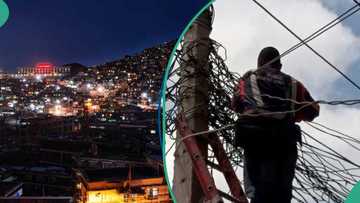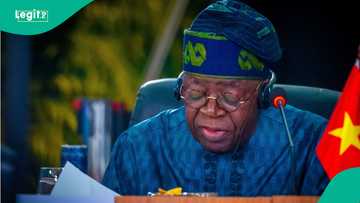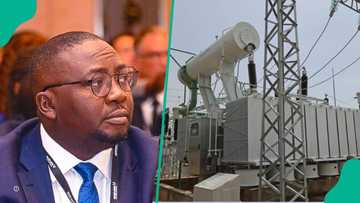FG Speaks on Increasing Electricity Tariff Again, Nigerians Protest
- The federal government is working to transition Nigeria's electricity sector to a cost-reflective tariff system to prevent its N4 trillion debt from increasing
- Minister of Power, Adebayo Adelabu, emphasized the need to increase power generation and improve market liquidity while expanding renewable energy
- Consumer groups are concerned that improvements in service delivery could lead to utility companies defrauding energy users
Legit.ng journalist Zainab Iwayemi has 5-year-experience covering the Economy, Technology, and Capital Market.
The federal government is striving to transition to a cost-reflective tariff in order to prevent the N4 trillion debt it owes the sector from increasing, Adebayo Adelabu, the Minister of Power, has stated.

Source: Getty Images
In his remarks at the Mission 300 Stakeholders' Engagement meeting in Abuja, the minister stated that this is one of the changes aimed at putting the electricity industry on a sustainable and bankable course.
Recall that Band A customers have complained about inadequate electricity supply and ongoing payments for defective electricity installations, even after the tariff was raised.
However, Adelabu asserted that the decision is essential to Nigeria's economic expansion and progress.
“Currently, there is a huge outstanding debt to the power generation companies in the form of unpaid government subsidies, which stands at about N4 trillion as of December 2024. The federal government is already working out modalities to defray this obligation and to ensure that further obligations are not accrued going forward. The government is working on a plan to transition the sector to a fully cost-reflective regime while implementing targeted subsidies for the economically vulnerable citizens in the country.”
This implies that the government would terminate the electrical sector's subsidy program, leading to a general increase in tariffs.
In the first half of 2025, the government paid N1.1 trillion in subsidies, according to a Daily Trust report, bringing its debt to N5 trillion.
In a statement sent by his media assistant, Bolaji Tunji, the minister stated that increasing power generation by reclaiming idle capacity and broadening the energy mix will be a top priority in order to guarantee energy security and diversify the power pool with more affordable and environmentally friendly energy sources.
He announced that the government's priorities for power sector reforms include addressing the market liquidity issues and initiating required sector reforms.
“Other areas include expanding transmission infrastructure to deliver more power, ensuring stability of the national grid to put an end to several grid disturbances and collapses previously observed, and further strengthening the coordination and management of the national grid.”
The minister added that in order to provide neglected and unserved populations with a dependable power source, the ministry is working to expand renewable energy through its energy transformation and rural electrification initiative.
He urged the public sector, private sector, philanthropic actors, development partners, and civil society organizations to unite behind this mission, saying that the stakeholders' meeting would give them a chance to coordinate, plan, and form the partnerships required to move from the Nigeria Energy Compact to tangible results.
Consumers respond
Kunle Olubiyo, the president of the Nigeria Consumer Protection Network said that any improvement to the current service delivery system would result in utility companies defrauding energy users.
Despite band segmentation helping to triple the inflow of revenue in the past year, he added that there has not been growth in power generation, transmission infrastructure, or the upgrading of distribution networks.
“If you increase across the board, what assurance will there be of cost-reflective service? The Performance Improvement Plan and investment in infrastructure over the last 10 years have not brought about any increase in generation, transmission evacuation, or distribution. You can imagine that between 2015 and today, we have only added 400 megawatts because, at the time of Jonathan’s administration, we celebrated the equilibrium of generation, transmission, and distribution at 5,600 megawatts."
Brian Mott said,
"Electricity in Nigeria has gotten to a point where it is highly worrying to citizens. The government need to do better by improving electricity situation in the country."
Minister tells Nigerians to prepare for higher tariff
Legit.ng reported that the Minister of Power, Adebayo Adelabu, says Nigeria’s economy can no longer sustain electricity subsidies and has asked Nigerians to brace for new, cost-reflective tariffs.
Speaking during a meeting with the Chairmen of Electricity Generating Companies (GenCos) in Abuja over the weekend, Adelabu said the government’s subsidy has increased to over N4 trillion in unpaid debts, and it is threatening the power sector's survival.
He however added that the Federal Government would continue to provide targeted subsidies for economically disadvantaged Nigerians, but did not clarify the category of people who would benefit.
Source: Legit.ng






